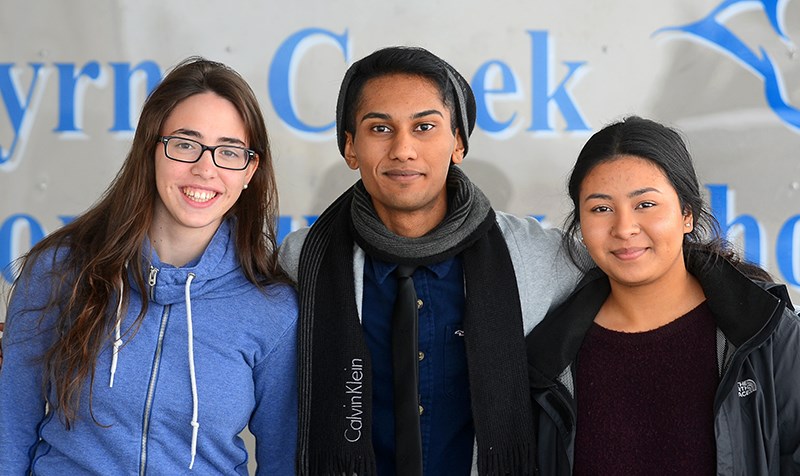Older students at Byrne Creek Community School will soon be teaching younger kids about tricky topics like sexual consent and dating violence.
Last month, Grade 12 students Francesca Ferraresso and Nikhil Narayan and Grade 11 student Jasmine Morrison attended a two-day Red Cross conference on healthy youth relationships, and they’ll be passing on their learning to Grade 8 and 9 students in the coming months and elementary kids after that.
The Red Cross conference, attended by about 150 high school students from around the province, was designed to certify students as youth facilitators to teach the Red Cross’s healthy youth relationships course.
It’s the first time high school students will take on a teaching role in the course, which deals with topics like personal boundaries, gender identity and sexual orientation, media influence, dating violence, consent and sexting.
They’re tough topics, admits Red Cross Respect Education manager Mary Crocker, but getting kids involved in teaching other kids about them is effective, she said.
“Younger students and peers tend to both take a subject more seriously when it’s role-modelled by their fellow classmates,” she said. “Sometimes subjects can be really intimidating to even approach, and yet they’re so important to talk about, and having youth trained up in it and being able to bring down the alarm level of certain subjects, it’s very comforting.”
And students taking on a facilitator role will always be supported in the classroom by an adult teacher.
“We care about their safety as well, obviously, and we want them to feel like there are clear boundaries about what they can and cannot do as a youth facilitator,” Crocker said.
If a fellow student discloses a serious problem, for example, youth facilitators have been trained to be clear it will be passed on to a teacher to follow up on with help from other staff, like counsellors.
“It’s a very carefully nuanced role that we’ve put a lot of time and research into considering and that we really feel is effective,” Crocker said.
At Byrne Creek, community school coordinator Bal Dhillon will be the adult support – or “adult advisor” – behind the revamped course, which will first be delivered to Grade 8 and 9 students at the school during tutorial time and then to Grade 6s and 7s at Byrne’s feeder schools: Twelfth Avenue, Taylor Park and Edmonds.
“Because some of the topics are so difficult to talk about, they can’t do it on their own, so they co-facilitate it and that will be with me,” Dhillon said.
The topics covered might be tough for students to talk about, but Dhillon doesn’t expect the course to raise any controversy.
“Our community is very ethnically diverse,” he said, “and that has to be taken into consideration in our delivery, but this stuff matters to everybody.”
Ferraresso agrees.
“I like talking about these problems,” she said. “I think the most important thing students have to know is that the problems exist and that we have to do something about them.”
For Crocker, having students like Ferraresso talking to other students about the issues lends a whole new level of credibility to the program.
“They are the life practitioners that breathe the relevance of what we’re teaching into the classroom,” she said.



